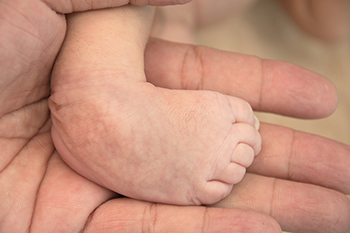Freehold (732) 294-9393
Freehold (732) 294-9393

A rare foot condition that is generally identified after birth is known as clubfoot. Typically, one foot is affected in babies that are born with this condition, and in some cases, both feet have been afflicted. It is defined as an ailment that turns the foot sharply inward while the toes point towards the other foot. Children who have clubfoot try to maintain balance and can wobble as they walk. This condition often develops from genetic reasons, and it may be more prevalent among children whose mothers smoke or drink during their pregnancy. Many patients choose to manipulate the foot by performing specific stretches, as this may help to guide the foot into alignment. An effective treatment method is known as the Ponseti technique, and this involves putting the affected foot in a cast after it has been stretched into a normal position. This can be helpful in keeping the foot in the correct position until it is fully healed. If the clubfoot is severe or corrective treatment does not yield the desired results, surgery may be necessary. This can be beneficial in putting the bones, tendons, joints, and ligaments into their normal positions. If you would like additional information about clubfoot, it is strongly suggested that you consult with a podiatrist who can answer any questions you may have.
Congenital foot problems require immediate attention to avoid future complications. If you have any concerns, contact Dr. Henry Miller of New Jersey. Our doctor can provide the care you need to keep you pain-free and on your feet.
Congenital foot problems are deformities affecting the feet, toes, and/or ankles that children are born with. Some of these conditions have a genetic cause while others just happen. Some specific foot ailments that children may be born with include clubfeet, polydactyly/macrodactyly, and cleft foot. There are several other foot anomalies that can occur congenitally. What all of these conditions have in common is that a child may experience difficulty walking or performing everyday activities, as well as trouble finding footwear that fits their foot deformity. Some of these conditions are more serious than others. Consulting with a podiatrist as early as possible will help in properly diagnosing a child’s foot condition while getting the necessary treatment underway.
What are Causes of Congenital Foot Problem?
A congenital foot problem is one that happens to a child at birth. These conditions can be caused by a genetic predisposition, developmental or positional abnormalities during gestation, or with no known cause.
What are Symptoms of Congenital Foot Problems?
Symptoms vary by the congenital condition. Symptoms may consist of the following:
Treatment and Prevention
While there is nothing one can do to prevent congenital foot problems, raising awareness and receiving neonatal screenings are important. Early detection by taking your child to a podiatrist leads to the best outcome possible.
If you have any questions please feel free to contact our office located in Freehold, NJ . We offer the newest diagnostic tools and technology to treat your foot and ankle needs.